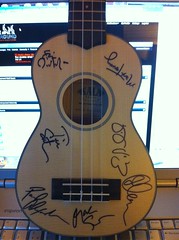Hi there. It was suggested on the Uke Talk board that I brought my question over here - I hope you can help me with some good advice.
I got my Kala spruce travel uke signed by the band Midlake at a recent festival. I love it!

Trouble is, this isn't an opportunist eBay thing, and I don't want more signatures either - I want to take my travel uke to a lot more festivals and play it without rubbing off the Midlake sigs.
It's signed with a Sharpie, I believe. How can I coat/spray/paint/tape or somehow protect the front of the uke so that it looks neat, protects the sigs and doesn't bleed the ink?
I was hoping I could just take the strings off and spray with some sort of fine lacquer or something that wouldn't affect the chemicals in the Sharpie ink? (I don't have the pen used to write on the uke)
Any help much appreciated - this uke MUST continue to be my Festy beater, just with added Midlake cool
What products / approach should I use? Thank you.
I got my Kala spruce travel uke signed by the band Midlake at a recent festival. I love it!

Trouble is, this isn't an opportunist eBay thing, and I don't want more signatures either - I want to take my travel uke to a lot more festivals and play it without rubbing off the Midlake sigs.
It's signed with a Sharpie, I believe. How can I coat/spray/paint/tape or somehow protect the front of the uke so that it looks neat, protects the sigs and doesn't bleed the ink?
I was hoping I could just take the strings off and spray with some sort of fine lacquer or something that wouldn't affect the chemicals in the Sharpie ink? (I don't have the pen used to write on the uke)
Any help much appreciated - this uke MUST continue to be my Festy beater, just with added Midlake cool
What products / approach should I use? Thank you.

